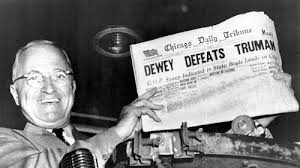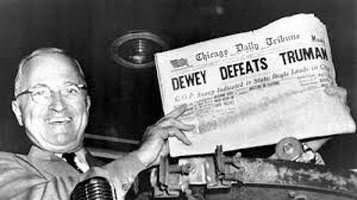Polling is a regular part of modern presidential campaigns. But just how accurate are they? What have been some of the times when polls have not reflected reality, and why have these errors occurred? What is the methodology that is used in developing a scientific sample and are all polls created equal?
Video of lecture online: On April 14, 2016, Dr. Michael Artime and I addressed these and other issues in our lecture at the University of Puget Sound in Tacoma, Washington. The video of the lecture and Q&A session is now available online.
Self-fulfilling prophecy: Polls are intended to reflect a snapshot of public opinion at one point in time. But there are some unintended consequences of polls and sometimes they end up being a self-fulfilling prophecy when they are used for other purposes. Some of the questions we addressed include the following:
- Do polls impact actual voting?
- Do polls build momentum or cause loss of support
- Do polls affect fundraising?
- Do polls and exit polls keep people from voting?
- Are polls an accurate way to pick debate participation?
- Do the type of polls affect results?
Challenges of polling: One of the premier polling companies, Gallup, has decided to not do polling in 2016 on presidential candidates due to problems with polling methodology brought about by changing technology. For example, nearly half of adults are unreachable on a landline phone, and approximately 9 out of 10 people contacted by landline are unwilling to participate in a poll. Large percentages of young people only have a cell phone, and polls that rely on or use cell phones are thus reaching a population that may be more favorable to one candidate over another.
Wording matters: How poll questions are asked and the order of the questions can make a big difference in the result. For example, if respondents are asked whether they favor financial assistance to the banking sector, they may give a more favorable response than if they are asked if they favor government bailouts. Wording that is leading or suggestive does not provide a valid reflection of opinion. For example, a question that is laden with a value judgment such as “given Candidate X’s lack of foreign policy experience, would you support this candidate for president” is not a valid poll question.
All polls are not created equal: There are good polls and there are polls that do not use appropriate sampling or wording. FiveThirtyEight.com actually rates the reliability of polls, and RealClearPolitics.com aggregates or averages all polls (without judging the validity of the polls) to give a broader sense of how the public may be feeling at any given point in time about a candidate or issue.
Classic poll failure: The 1948 presidential campaign produced one of the most stunning failures of modern polling that was still in its infancy. Elmo Roper stopped polling two months before the election between President Harry S Truman and Thomas Dewey because as he said: “Thomas E. Dewey is almost as good as elected…I can think of no thing duller or more intellectually barren than acting like a sports announcer who feels he must pretend he is witnessing a neck-and-neck race.” What Roper and other pollsters failed to account for was the last minute nature of voters’ decisions. They also did not factor in the rigorous 31,000 mile train trip of Truman as he whistlestopped across the nation campaigning to retain the office he had inherited upon Franklin Roosevelt’s death. In the end, of course, Truman won, despite the early edition of the Chicago Daily Tribune that Truman gleefully held up for reporters that proclaimed “Dewey Defeats Truman.”
thing duller or more intellectually barren than acting like a sports announcer who feels he must pretend he is witnessing a neck-and-neck race.” What Roper and other pollsters failed to account for was the last minute nature of voters’ decisions. They also did not factor in the rigorous 31,000 mile train trip of Truman as he whistlestopped across the nation campaigning to retain the office he had inherited upon Franklin Roosevelt’s death. In the end, of course, Truman won, despite the early edition of the Chicago Daily Tribune that Truman gleefully held up for reporters that proclaimed “Dewey Defeats Truman.”
Election forecasting: Besides polls, there are many other models that are often used to predict presidential elections. Some are bellwether cities or counties or states that have historically voted with a high level of accuracy for the winning candidate. Some are economic models that take into account the state of the economy or unemployment in predicting the winner, or the likelihood a which party will win the White House depending on which party has most recently held the presidency. And there are also predictive markets online as well as online betting markets.
Watch the video: Click here to watch the video of the lecture on “How Accurate Are the Polls?” for more details. The other previous four lectures in the series “Who Will Win the White House?” are also available on line by clicking here.


 Facebook
Facebook
 Twitter
Twitter
 LinkedIn
LinkedIn
 YouTube
YouTube
 Pinterest
Pinterest